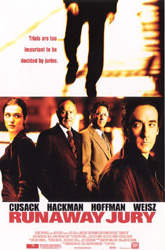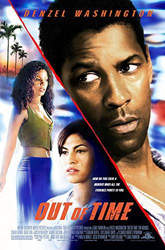 Director: Starring: Release: 24 Oct. 03
|
Scary Movie 3 BY: DAVID PERRY I hate reviewing spoofs like the Scary Movie films because I often feel that thereís nothing there to really write about. After all, this is a genre that is essentially little more than repeating elements from other films, changing them slightly, getting a laugh, repeating. How can I write a thoughtful commentary on a film that clocks-in at less than 90 minutes, is based on repetition, and hasnít any substance to analyze. At its earliest, I could look at the introduction of a new form of comedy. At its close (which I hope is upon us), I can only contemplate what to write. I could sit and transcribe jokes for 500 words, but that would be a waste of my time and an offense to the rare funny moments in Scary Movie 3 that deserve the freshness of seeing it in the cinema if you are unlucky enough to do so. But there is something to write about, I suppose, in the understanding of the evolution of this film series from its auspicious 1999 debut to its ugly 2001 sequel to its currently boring incarnation. There was a promise in the tagline for Scary Movie: ďNo Mercy, No Shame, No Sequel.Ē When that film broke $100 million, it became clear that Miramax would do anything to ensure that the promise was not kept. I liked that first film because it dealt with a genre that certainly deserved some ridicule, as well as the way it showed homage as a worthy joke-inducer. However much Scream (and to a lesser degree I Know What You Did Last Summer) came from the loins of Friday the 13th, A Nightmare on Elm Street, Halloween, and its other slasher precursors, it was a film unto itself, a referential animal self-conscious of its existence. I like Scream and consider I Know What You Did Last Summer to be a guilty pleasure, but Iíll be the first one to admit that its solemnity in the face of satire made it prime for mocking. The wicked wit of the Wayans brothers made Scary Movie work by recognizing the problems with those films and turning them into humorous comedy. Little was changed other than the tone (I still believe that much of the success was on the shoulders of star Anna Faris, as Neve Campbell/Jennifer Love Hewitt). All was lost in the second film, as the Wayans discovered that little remained to be made fun of out of those films. Ultimately, it was one of the worst films of the year, delivering no laughs and wasting the talents of people like David Cross. The third film was meant to be a spoof of the mystical films of the moment like Harry Potter and The Lord of the Rings, but that fell through and the Wayans brothers left the franchise. Enter Airplane! co-creator David Zucker to keep milking the cash cow dry (at this point, I think itís dead). He tries to return to the first, spoofing such films as Signs, The Ring, and 8 Mile (?), but fails to find the parts of those films deserving of ridicule. Though I laughed through much of Scary Movie, I only remember one laugh in Scary Movie 3 (a bit with the dogs from Signs acting weird -- a bit of absurdist comedy genius worthy of Cabin Fever). That is a pretty sad downfall. There, 556 words. Happy? Just
please promise me I wonít have to struggle to come up with something to
write on Scary Movie 4. |
|
| ©2003, David Perry, Cinema-Scene.com, 24 October 2003 | ||



